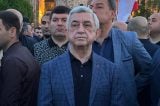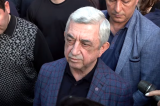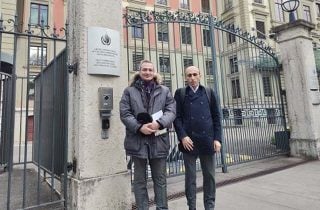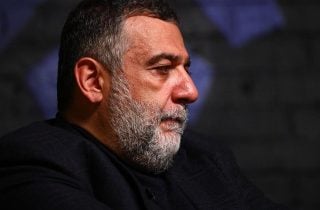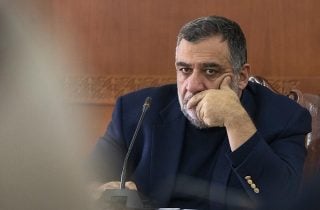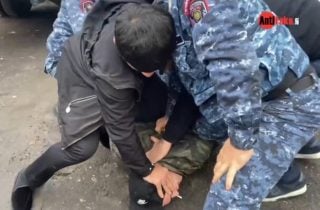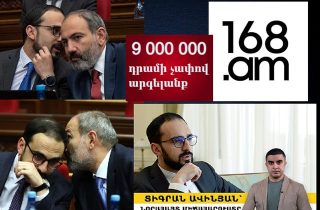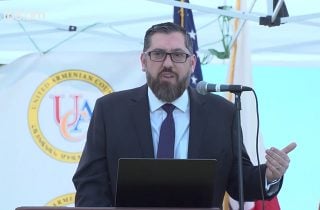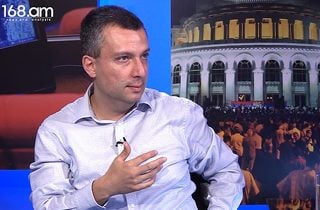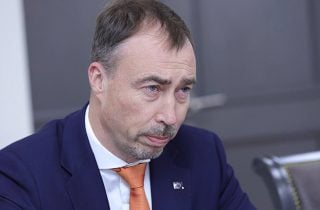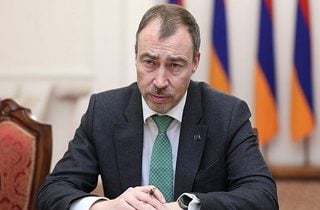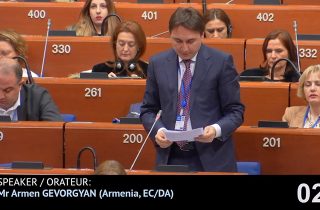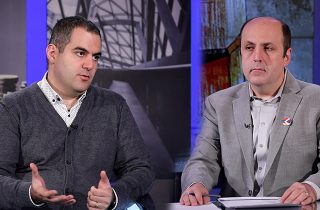“The continuing dialogue between both parties has taken the form of a joint scoping exercise”
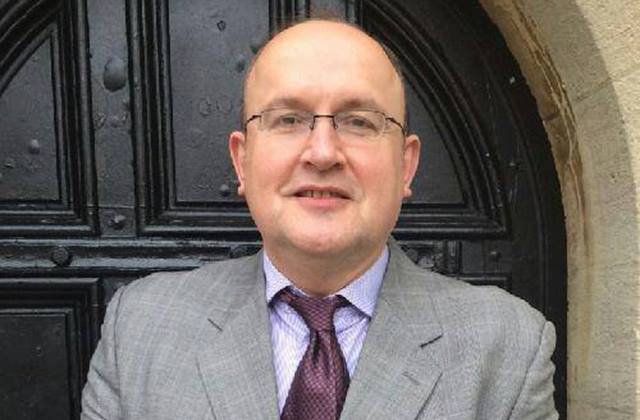
The second phase of negotiations on development of a new legal base of Armenia-EU bilateral relations initiated on December 7, 2015 may be considered accomplished. In negotiations of the future accord to substitute the Association Agreement (which the parties were to pre-sign in 2013, after over 3 years of negotiations), have initiated complicated provisions, as a result of which negotiation process has slowed down. Piotr Świtalski, Ambassador Extraordinary and Plenipotentiary, Head of EU Delegation to Armenia, delivered his remarks in this regard. He stated that they needed to develop complicated parts. “168 Hours” covered Armenia-EU relations, productivity of present-day policy by the Neighborhood with Günter Walzenbach, Senior Lecturer in European Politics at the University of the West of England, Bristol. He is specialized in political economy, relative European policy, European Neighborhood policy, EU foreign policy.
Edgars Rinkēvičs, Foreign Minister of Latvia, touched upon the necessity to start negotiations on Association with Armenia and Azerbaijan. But maybe you know that last year Armenia started new negotiation around with the EU to sign a new agreement with the EU without having chance to sign only the political part of the AA being a member of the EEU. How do you explain the statement by Mr. Rinkevich? Is it possible to launch negotiations with Armenia and Azerbaijan on AA again?
The statements by the Latvian Foreign Minister must be seen in the light of the negotiations after the failed Vilnius summit and the decision by Armenia not to proceed with the Association Agreement that was then on the table. Since then the continuing dialogue between both parties has taken the form of a joint scoping exercise to clarify precisely what shape, form and remit a prospective alternative arrangement could take. Both sides have officially avoided the term Association Agreement in this context and instead opted for a politically less loaded terminology around a ‘new agreement’ or ‘future agreement’ which eventually will replace the dated Partnership and Cooperation Agreement of 1999. It may have been the political intention of Mr. Rinkēvičs to offer reassurance to interested parties in so far as there will be a degree of continuity between the previous and forthcoming agreement in substantive terms.
As you know, currently Armenia and Azerbaijan are negotiating with the EU to sign a new document with the EU, as they refused to sign AA. Many experts think that Azerbaijan will sign new document ahead of Armenia as it is not as independent in this sphere as Azerbaijan, because Armenia is a member of EEU and is coordinating all his steps towards EU with Moscow. What do you think of this?
Armenia should not see itself in a competitive process with Azerbaijan as regards the timing, or indeed substance, of a new framework for cooperation with the European Union. This would not be in the spirit of the revised EU strategy as regards the Eastern Partnership. The latter now appears to be much more open to accept degrees of differentiation among the partner countries and attempts to be more responsive to individual country needs and demands. While the nesting of EU-Armenia negotiations in the emerging arrangements of the Eurasian Economic Union is certainly a complicating factor, a similar argument could be advanced as regards the influence of Turkish positions on the negotiation stance taken by Azerbaijan.
Armenia and the EU are negotiating the second round of the document negotiations but as Ambassador Switalski says, there are few problems in the process. Taking into consideration these problems, to your mind, when will the parties be able to finalize the document and with what kind of results?
It is my expectation that negotiators will attempt to synchronize the conclusion of a new agreement with the conclusion of the current Single Support Framework in 2017 and the start of a new planning phase for the European Neighborhood Instrument (ENI) in 2020. Key priority areas for a future agreement have been publicized by the European External Action Service and should allow progress on a broad range of issues important to the future development of Armenian society. In general terms tangible results should be easier to achieve on technocratic measures related to energy policy, transport infrastructure and the environment rather than on major trade and investment deals. However, in negotiations of this kind all parties involved are likely to apply a general principle according to which ‘nothing is agreed until everything is agreed’.
How do you assess EU’s current Neighborhood policy taking into consideration the fact that after the war in Ukraine EU revised its policy in EaP region. To your mind, is it enough for peaceful neighborhood?
The revision of the neighborhood policy is still ongoing and far from complete. There does not seem to be any intention to reduce it to an external strategy that is exclusively focused on peace and conflict management. Both in its multilateral and bilateral dimensions there is huge potential for the streamlining of activities, effectiveness gains and improved visibility of the EU contribution. At the same time, its overall objective to bring stability and prosperity to neighboring countries and regions works against a refocusing exclusively along the security dimension; even if this has become a key concern for some of the participating countries. In short, a peaceful neighborhood might not be everything, but without it everything else is nothing. This suggests a setting of clear country-specific priorities as well as an emphasis on the inter-connectedness of the diverse policy-areas under consideration.
All the problems, as many experts insist, in EaP are linked to Russia, as many EaP states are dependent from Russia in security field as Armenia, Azerbaijan, have territorial conflicts, so they need more security for their independent policy, but EU can’t provide security guarantees to these states. So, how do you see solution to this problem which is essential for these states?
The European Union has always taken pride in its role as a civilian and normative power apart from the military capabilities of its member states. Hence, as an organization, it has an overarching commitment to the peaceful resolution of conflicts. In practice this often means an engagement with other international and regional organizations that are equal, or more important, actors in finding workable political solutions to localized crisis constellations and long-standing military confrontations. The conflict in Nagorno-Karabakh is a prime example. There is no alternative to the OSCE Minsk Group as it also brings the Russian Federation and the United States to the negotiation table. At the same time, the EU does coordinate its activities with NATO and the UN Security Council as part of its Common Foreign and Security Policy. Over the years diplomatic mechanisms and procedures have developed that try to create a regional environment within which peaceful conflict resolution has a better chance of success.
By Araks Martirosyan





